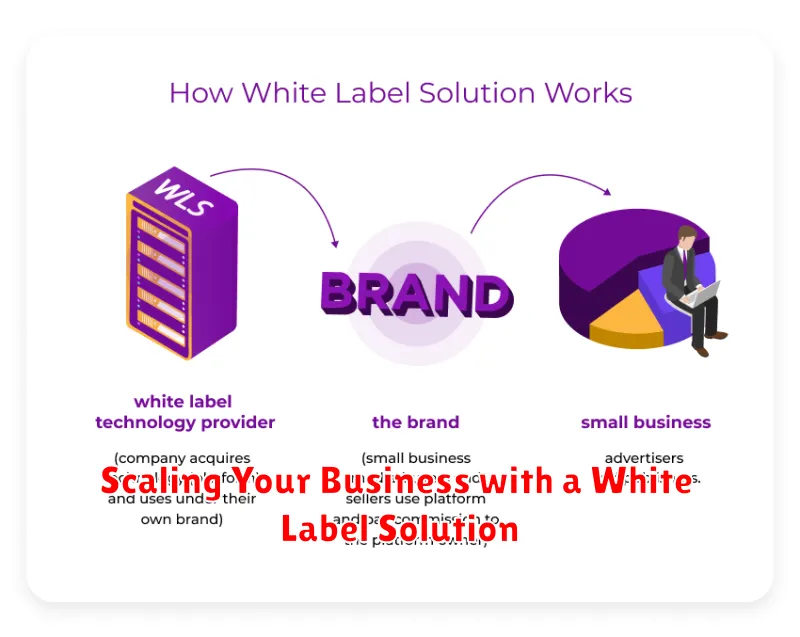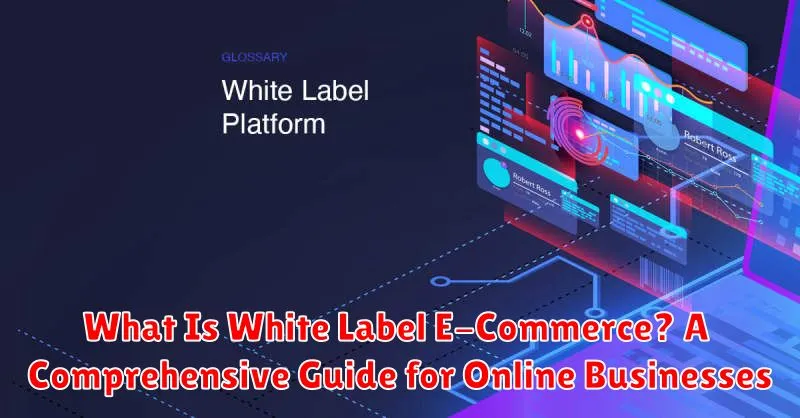In today’s competitive digital landscape, establishing a robust online presence is crucial for business success. White label e-commerce offers a streamlined and efficient solution for businesses seeking to launch or expand their online sales channels. This comprehensive guide delves into the intricacies of white label e-commerce, exploring its benefits, functionalities, and potential impact on your online business. Understanding the core principles of white label platforms, private label e-commerce, and e-commerce platforms is essential for making informed decisions about your online strategy. Whether you’re a startup, small business, or established enterprise, this guide will equip you with the knowledge to navigate the world of white label e-commerce effectively.
White label e-commerce allows businesses to leverage pre-built platforms and infrastructure to quickly deploy a fully functional online store. This eliminates the need for extensive development, significantly reducing time to market. By focusing on branding and marketing, rather than technical complexities, businesses can optimize their resources and accelerate growth. This guide will cover the key features and advantages of white label solutions, including customization options, scalability, and cost-effectiveness. We’ll also discuss the important considerations involved in selecting a white label e-commerce platform, helping you choose the best solution to meet your specific business needs and objectives.
Understanding the Basics of White Label E-Commerce
White label e-commerce refers to a business model where you sell products or services online using a pre-built platform provided by a third-party. This platform handles the technical complexities of running an online store, such as hosting, security, and payment processing. You, as the merchant, focus on branding and marketing.
Essentially, you’re rebranding an existing e-commerce solution and presenting it to your customers as your own. Think of it like buying a plain white t-shirt and adding your own logo and design. The core functionality is already there; you’re just customizing the appearance and user experience to match your brand.
This approach differs from building an e-commerce store from scratch, which requires significant technical expertise and investment. With a white label solution, you can launch your online store quickly and efficiently, focusing your resources on building your brand and acquiring customers.
Key components typically included in a white label e-commerce platform are product catalog management, order processing, customer support tools, and basic analytics. You then customize the design and integrate with other tools as needed.
Benefits of Using a White Label E-Commerce Platform
Leveraging a white label e-commerce platform offers numerous advantages for businesses looking to establish an online presence quickly and efficiently. A primary benefit is the reduced time to market. Instead of building a platform from scratch, you can utilize an existing solution, significantly shortening the launch process.
Cost savings are another compelling reason. Development, maintenance, and ongoing updates are handled by the platform provider, freeing up your resources. This allows you to focus on other crucial aspects of your business, such as marketing and customer service.
Scalability is also a key advantage. As your business grows, a white label platform can easily accommodate increased traffic and sales volume. The provider handles the technical infrastructure, ensuring a seamless experience for your customers even during peak periods.
Finally, white label solutions offer a high degree of customization. You can tailor the platform to match your brand identity, ensuring a consistent customer experience across all touchpoints. This includes customizing the look and feel of your online store, as well as integrating with other essential business tools.
Choosing the Right White Label Solution for Your Business
Selecting the right white label e-commerce platform is crucial for your business’s success. Several key factors should guide your decision-making process. Carefully evaluating these aspects will ensure a seamless integration and optimal performance.
Scalability is paramount. Your chosen platform should accommodate future growth without requiring a complete system overhaul. Consider your projected sales volume and product expansion plans.
Pricing structures vary significantly. Analyze the different models, including transaction fees, monthly subscriptions, and setup costs, to determine the most cost-effective solution for your budget.
Customization options are essential for branding and creating a unique customer experience. Evaluate the platform’s flexibility in terms of design, features, and integrations.
Technical support is vital for troubleshooting and resolving any technical issues. Ensure the provider offers reliable and accessible support channels.
Customizing Your White Label Store for Branding
A key advantage of white label e-commerce is the ability to customize the platform to reflect your brand identity. This ensures a consistent customer experience and reinforces brand recognition. Customization options typically encompass several key areas:
Visual Elements: Modify the look and feel of your store with your logo, color palette, and typography. Many platforms offer pre-designed templates to streamline this process. Implementing your unique visual elements creates a cohesive brand experience for your customers.
Domain and Subdomain: Utilize your own domain name or a subdomain to create a seamless connection with your existing online presence. This contributes to a professional image and strengthens brand trust.
Content and Messaging: Tailor product descriptions, about us sections, and other content to match your brand voice and target audience. Consistent messaging is crucial for conveying your brand’s values and personality.
Integrating Your White Label Platform with Other Tools
A key advantage of white label e-commerce is its flexibility to integrate with other business tools. Seamless integration streamlines operations and enhances the customer experience. Consider these crucial integrations:
CRM (Customer Relationship Management)
Integrating your CRM with your white label platform allows for personalized marketing and improved customer service by centralizing customer data. This enables targeted email campaigns, personalized recommendations, and efficient customer support.
Marketing Automation Platforms
Automating marketing tasks is vital for efficiency. Integration with marketing automation tools enables automated email sequences, targeted advertising, and social media management, freeing up time and resources.
Inventory Management Systems
Accurate inventory management is critical. Integrating with an inventory management system ensures real-time inventory updates, preventing overselling and stockouts. This integration streamlines order fulfillment and improves overall operational efficiency.
Payment Gateways
Offering multiple payment options is essential for a positive customer experience. Secure and reliable payment gateway integrations are crucial for processing transactions smoothly and securely. Ensure your chosen platform supports a variety of payment methods to cater to a wider audience.
Analytics and Reporting Tools
Tracking key metrics is vital for business growth. Integrating with analytics tools provides valuable insights into sales data, customer behavior, and marketing performance. This data empowers informed decision-making and optimization strategies.
Managing Inventory and Orders on Your White Label Platform
Efficient inventory and order management is crucial for the success of any e-commerce business. A white label platform simplifies these processes, providing you with the tools to streamline operations.
Inventory Tracking: Most platforms offer real-time inventory tracking. This allows you to monitor stock levels, predict demand, and avoid stockouts or overstocking. Automated low-stock alerts help you replenish inventory promptly.
Order Processing: White label platforms automate order processing, from receiving the order to generating shipping labels. This reduces manual work and minimizes errors. You can easily manage order statuses, track shipments, and handle returns within the platform.
Integration with Shipping Providers: Many platforms seamlessly integrate with various shipping providers, enabling you to compare shipping rates and choose the best option for your customers. This integration also automates label creation and tracking updates.
Marketing Your White Label E-Commerce Business
Marketing a white label e-commerce business requires a focused strategy that builds brand recognition and attracts customers. Unlike established marketplaces, you’re building from the ground up.
Search Engine Optimization (SEO) is crucial. Optimize your product descriptions and website content with relevant keywords to improve organic search rankings. Consider a blog with valuable content related to your niche.
Paid advertising can provide a quick boost. Utilize platforms like Google Ads and social media advertising to target specific demographics interested in your offerings.
Social media marketing is essential for building a community. Engage with your target audience on platforms relevant to your niche. Consistent posting and interaction are key.
Email marketing is a valuable tool for nurturing leads and promoting special offers. Build an email list and send targeted campaigns to segmented customer groups.
Scaling Your Business with a White Label Solution

A key advantage of white label e-commerce is its scalability. As your business grows, your platform can easily adapt to meet increasing demands.
Increased order volume is handled efficiently through automated processes and integrated systems. This allows you to focus on growth strategies rather than logistical bottlenecks.
Expanding your product offerings is seamless with a white label solution. Adding new products or entire categories requires minimal technical effort, enabling you to quickly respond to market trends and customer demands.
White label platforms often provide flexible subscription tiers, allowing you to scale your resources (bandwidth, storage, support) in line with your business growth. This pay-as-you-grow model ensures cost-effectiveness as you expand.
Examples of Successful White Label E-Commerce Businesses

Examining successful businesses leveraging white label e-commerce can offer valuable insights. While specific company names and detailed data are confidential, we can explore general examples illustrating successful implementation across diverse sectors.
Fashion and Apparel: Imagine a fashion influencer launching their own branded online store. By utilizing a white label platform, they can quickly establish a professional presence, offering personalized apparel and accessories without managing complex backend infrastructure. This allows them to focus on design and marketing, leveraging their existing audience for rapid growth.
Health and Wellness: A nutritionist might develop a line of supplements and offer them through a white label e-commerce solution. This allows them to control branding and customer experience while outsourcing order fulfillment and other logistical challenges, freeing up their time to focus on client consultations and content creation.
Specialty Foods: A local artisan food producer, such as a jam maker, can expand their reach significantly by utilizing a white label platform. They can offer a seamless online ordering experience, reaching customers beyond their local farmers’ market, without the investment required to build a dedicated e-commerce platform from scratch.

